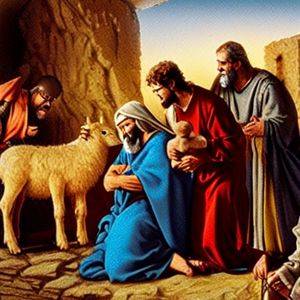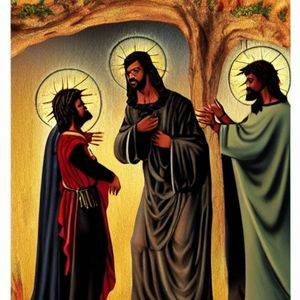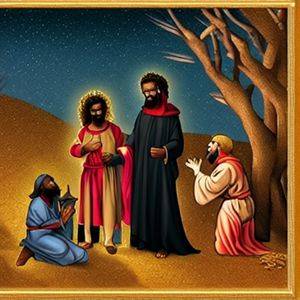We all know that the story of Jesus Christ’s birth has been told around the world for centuries and generations, and we often overlook one particular event of significant importance, which is the visit of the shepherds to baby Jesus.
Today, we’ll be exploring why this occasion, a momentous one, was so impactful and what it meant for people in those days as well as today.
Let’s get started on the “shepherds visit Jesus” story.
Overview of the Biblical account of the shepherds’ visit to Jesus Christ
The “shepherds visit Jesus” account is recorded in Luke and Matthew’s gospels. The story will only make sense when you read Luke 2 and Matthew 2.
Shepherds Visit Jesus – the visit from the shepherds (luke 2 8-20)
1. Why God chose this approach
- This remarkable event, as described in the Bible was chosen by God as His way to announce that our Savior had finally arrived.
- Even though they were mere shepherds who had no political or religious significance at that time period, they too would be asked to play an important role, one that made it clear that Jesus’ love was down-to-earth, and was enough for all types of people, Jew and gentile alike, to accept Him fully as their Messiah (John 4:22).
- This visit by the shepherds was integral to the earthly mission of Christ, that is, to save mankind from their sins, as He encountered some of his first earthly visitors during His birth.
- Furthermore, it demonstrated how something so momentous could happen among these ordinary folks, who were living their normal everyday lives – it certainly put an emphasis on Grace!
2. The meaning and significance of the shepherds’ visit (significance of shepherds at Jesus’ birth)
The visit of the shepherds to the baby Jesus is an important event in the Gospels of Luke and Matthew. It communicates a message of divine love and acceptance, indicating that God’s salvation was available to all people, even lowly shepherds.
Therefore, the visit serves as a reminder that there is no class distinction in God’s kingdom as He invites people to believe in Jesus no matter who they are or where they are from. Your skin color, the language you speak, and your physical attributes, all don’t count.
We have to note that the customs and beliefs of first-century Judaism play an important role in understanding the significance attached to this story.
In the ancient Near East, shepherds were usually looked upon as men of low social status, who were seen as filthy, good for nothing, with no future, greedy, and untrustworthy. Practically, they were looked down upon. So it would have been considered improper for them to appear in any respectable setting, let alone at the birth of the Messiah.
Despite these impressions, God chose these humble shepherds to be among His messengers when He proclaimed Christ’s birth to humanity.
This story also challenges traditional religious beliefs by illustrating that holiness isn’t determined by material wealth or one’s social standing; it comes through simply believing in the Lord Jesus Christ.
Furthermore, John Chrysostom explains that the arrival of the angels preceding the shepherd’s visit symbolizes God’s special favor towards those who don’t enjoy high status or affluence on earth.
When land-owning elites refused to accept Jesus’ presence on earth, God made sure humble shepherds had priority access to Him so there would be little room for doubt regarding His identity and authority over all humanity regardless of their earthly station:
“…that all should honor the Son just as they honor the Father. He who does not honor the Son does not honor the Father who sent Him.
John 5:23
In a nutshell, when we consider the meaning and importance behind the encounter between Jesus and His lowly visitors we find that it serves as both a powerful reminder about our social responsibilities as believers and a helpful illustration of how holiness transcends earthly possessions or status symbols.
Ships to the USA alone:
-
Product on sale
 Jesus Cross Toddler Jersey T-Shirt$19.99 – $29.99
Jesus Cross Toddler Jersey T-Shirt$19.99 – $29.99 -
Product on sale
 Jesus Cross Kids’ Jersey T-ShirtOriginal price was: $39.99.$30.99Current price is: $30.99.
Jesus Cross Kids’ Jersey T-ShirtOriginal price was: $39.99.$30.99Current price is: $30.99. -
Product on sale
 Jesus Cross Kids’ Sponge Fleece Hoodie$36.99 – $46.99
Jesus Cross Kids’ Sponge Fleece Hoodie$36.99 – $46.99
3. The connection between the shepherds and Jesus Christ‘s nativity story
The visitation of the shepherds to the infant Jesus is a major event in the nativity story, and there are many interpretations of its significance.
See, in biblical times, as stated above already, shepherds were looked down upon as inferior people of little willpower or responsibility. As lowly individuals in society, it might have been expected that the angels would appear to politically powerful individuals, business tycoons, and people of royalty instead.
- The symbolism of God’s angels appearing to these shepherds and announcing the birth of Jesus has been interpreted as God’s way of showing that no person is too lowly or insignificant for Him to be concerned with; He loves all His people alike. Yes, He loves you dearly!
- The presence of these humble outsiders at Jesus’ birth also makes it clear that Jesus did not come only for the powerful; He has come for everyone regardless of their social situations or circumstances.
In this sense, His inclusion of these seemingly powerless individuals can be seen as a testament to Christ’s message that all are welcomed into His life and salvation regardless of their backgrounds.
- Further, it can also be argued that by appearing to the humble shepherds who were attending their flocks late at night while watching over their sheep rather than engaging in spiritual activities, Jesus demonstrated from a young age, even as a toddler, his appreciation for hardworking and industrious individuals, that is, those who labor away quietly throughout their lives with no recognition from others.
He, Jesus Christ, is therefore showing us through this visit what type of people He values and appreciates; those who commit themselves tirelessly to faithful work and respectably serve others without expecting anything in return from them.
- It also teaches us that those who live exploitative lives will later find out that there’s humility in being modest by rather sticking to genuine ways of getting money.
4. The role of the shepherds in the nativity story
The visit of the shepherds to the Christ child is an important part of the nativity story. Their arrival is vividly described, and their journey to Bethlehem was guided by an angel of the Lord. What an encounter! This crucial scene in Jesus Christ’s infancy reveals God’s provision as well as prophetic significance.
The humble and ordinary shepherds visiting the baby Jesus, with gifts, highlights God’s choice to reveal Himself through often overlooked and marginalized individuals. They were a people living on the margins, whose profession was so lowly that they were excluded from participating in religious rituals because their “unclean” status prevented them from doing so.
Even today these are often misunderstood aspects of history, which makes it all more special when God chose this moment for such a revelation of Himself as our King who lies in a manger.
Moreover, these shepherds represent more than just ordinary Jews who happened to have had an extraordinary encounter with an angel from Heaven, they portray us, modern believers participating in worshiping our Savior! As they cared for their flock each night and watched over them day after day on those grazing grounds outside Bethlehem, God revealed His coming salvation through His faithful messenger. So also does He care for us, His flock, day and night.
Beloved of God, we can find assurance through this narrative that He will continue to be our Provider and Protector today, and forever, as we fervently serve Him with all we have.
5. The symbolism of the shepherds in the nativity story
The shepherds that visited baby Jesus in the Bethlehem stable are an essential part of the birth story of Jesus Christ.
While their presence at the nativity stands as a historical fact, their inclusion has a deeper symbolic meaning which is indicative of Jesus’ mission and message. Yes, His mission on earth and the message He came down to deliver.
To reiterate, shepherds were traditionally seen as social outcasts who worked on the margins of society; their very presence at the nativity scene carries with it a symbol of grace and mercy.
Thus God bestowed His special gift upon those who some may have seen as unworthy. The elements that characterize shepherding, such as caring for sheep, leading them to greener pastures, providing protection, finding them water, providing shelter, soothing and healing their wounds, etc., have great significance when applied to Jesus’ mission.
In the Bible, you’ll see that being a shepherd is figuratively used by biblical writers to provide insight into Jesus’ role on earth. Like sheep without a shepherd, His followers required him to serve, not only as their teacher but also as their leader and protector.
“…But when He saw the multitudes, He was moved with compassion for them, because they were weary and scattered, like sheep having no shepherd.”
Matthew 9:36
No wonder the Prophet Ezekiel uses shepherds to make a point. He intimated that one fundamental point of having a shepherd was to lead the sheep back safely to God’s care (Ezekiel 34) when they strayed away from faithfully doing His will; this again reveals more about Christ’s ministry, namely bringing sinners (both physically and spiritually) back onto the path of rightful living by his provision of mercy and grace.
Finally, like sheep were taken most seriously under the careful watchful gaze of shepherds, so too would people be practically attended to through Jesus’ service once he had ascended into heaven, thereby empowering us, his disciples, not to be afraid.
This is what Peter meant when he wrote:
“…2 Shepherd the flock of God which is among you, serving as overseers, not by compulsion but willingly, not for dishonest gain but eagerly; 3 nor as being lords over those entrusted to you, but being examples to the flock; 4 and when the Chief Shepherd appears, you will receive the crown of glory that does not fade away.
1 Peter 5:2-4
To end this section, we can say without mincing words that the shepherds in the story behind Jesus’ birth and visitation have much importance beyond being mere nobody, but rather, they provide all remnants with representations that shine a light on possibilities associated with Jesus Christ’s ultimate mission, and that is, restoring sinful humanity to an upright state with God, via divine love made possible through salvation gained from his gracious death on the cross of Calvary.
6. The importance of the shepherds’ visit in the overall nativity story
To recap, we know that the nativity story, also called the Christmas story by those who celebrate it, revolves around the miraculous birth of Jesus Christ.
This holy event was preceded by the appearance of an angel to a group of shepherds, who were watching their flocks by night, and announcing the good news. Thus began one of the most reverent and important visits to a newborn.
The visit of the shepherds is a key part of the whole story, as it demonstrates that even in Jesus’s humble beginnings he was thought worthy enough to be recognized by some unexpected guests. The shepherds’ visit is particularly significant for the following main reasons:
- Firstly, it reveals something about God’s plan and sovereignty, namely that he works through ordinary people in extraordinary ways;
- Secondly, it symbolizes how even the lowliest members of society could experience salvation and grace through Him.
- Not only is this visit symbolic of its timeless implications but also serves as proof that our faith must predict unquestionably God’s promises over any material wish or plan we might have in life.
- It provides us with guidance and encouragement as we remember that our future lies not in ourselves but in Someone far greater than us, Christ Himself, whose Majesty no angle in the nativity story could portray better than those humble shepherds on that silent night so long ago.
Some merchandise specially selected for you:
The impact of the shepherds’ visit on our understanding of Jesus Christ
The visit of the shepherds to Jesus Christ is among the most important events in the Gospels, as it reveals many aspects of Jesus’ identity, life on earth, death, teachings, and His divine nature.
The visit was a humble event, revealing that he was born into a humble family. The Bible states that these shepherds were from a working-class background, watching over their sheep in nearby fields.
Yet despite this humble beginning, an angel appeared to them proclaiming marvelous news:
9 And behold, an angel of the Lord stood before them, and the glory of the Lord shone around them, and they were greatly afraid. 10 Then the angel said to them, “Do not be afraid, for behold, I bring you good tidings of great joy which will be to all people.”
Luke 2:9-10
It was during their travels to Bethlehem that these shepherds became the very first visitors of Jesus after his birth. This reveals how even those from humble backgrounds could find themselves welcomed by Jesus and receive revelations that would affect their lives forever.
It also served as a stark foreshadowing that by welcoming everyone, especially those despised by society, Jesus would go on to completely revolutionize life. An example we all have to learn and cultivate.
Furthermore, it shows his understanding of our plight since he too had significant hardships. See, not only was he born into poverty but then having to flee with Mary and Joseph into Egypt out of fear for his life when faced with Herod’s massacre is a chilling experience for the young boy Jesus. (Matthew 2:13).
Before departing home with “great joy” (Luke 2:20), these shepherds had experienced a profound transformation in both knowledge and faith, witnessing exactly what had just been proclaimed through the heavenly host of angels (Luke 2:14). God, in this sense had become a man!
No wonder He is referred to as the “Son of Man”.
This profound realization left them filled with great joy and compelled them to proclaim throughout the region all they have learned about this baby boy named Jesus “who has been born king in Bethlehem” (Matthew 2:16).
By sharing this message with others they began transforming lives long before any public ministry took place since they were among the very first preachers within Christianity!
Altogether, we can see how pivotal this moment was in creating an early understanding of who exactly Jesus Christ was. Divinely, but given to men, an understanding which formed the foundation upon which Christianity has become known throughout history up until today.
The implications of the shepherds’ visit
The visit of the shepherds to Jesus Christ is one of the most significant events in the Christian tradition that serves as a reminder of Jesus’ divine calling and ministry.
Theological implication
- Theologically, it highlights how God chose to reveal Himself in human form, that ultimately He humbled himself so that all could come to Him and be saved (Phil. 2:6-11).
- It also exemplifies how we should prioritize our obedience to God’s command even when it conflicts with societal norms; just as the shepherds devoted themselves to following the angel’s directive, we, too, must be faithful in our own journey with Jesus.
Practical implications
- Practically speaking, this event encourages us to remember our unwavering commitment to serving God through acts of humility and faithfulness. In being obedient and attentive followers of Christ, we must be willing to put aside hesitations or doubt and follow His guidance even in difficult moments.
- Furthermore, as important members of a larger Christian community, we are inspired by the example set by these shepherds who spread the news of Jesus’ arrival among their circle; remembering this kind of boldness affects how we read scripture today, knowing that they were humble yet brave witnesses for Christ empowers us with similar courage moving forward.
- Finally, looking at the practical implications of this event informs our focus when undertaking any task for God’s kingdom, and that is prioritizing faithfulness above other motivations such as fame or renown.
As evidenced by Mary and Joseph’s experience in finding lodging upon arriving from Nazareth (Luke 2:4), favoring loyalty over ambition sets a lasting precedent for seeking proper proclamation and witnessing even if it means going against what may appear more convenient or beneficial at first glance.
Frequently asked questions
1. Did the shepherds visit Jesus?
- Yes, according to the account in the Gospel of Luke’s account, the shepherds visited Jesus after he was born in Bethlehem, after an angel appeared to them and told them about the birth of Jesus, saying, “Do not be afraid. I bring you good news of great joy that will be for all the people. Today in the town of David a Savior has been born to you; he is the Messiah, the Lord.”
2. What is the significance of the shepherds visit to Jesus?
- It’s significant because they were among the first people to visit Jesus after he was born in Bethlehem.
- Again, it represents one of the earliest instances of the recognition and adoration of Jesus as the Messiah. The shepherds were considered to be lowly and insignificant in the eyes of society, yet they were among the first to recognize and pay homage to the Messiah. This suggests that Jesus’ message was intended for all people, regardless of their social status or background.
- It also foreshadows the universal nature of Jesus’ ministry and the message of salvation that he brought. In the Gospel of Luke, the angel who appeared to the shepherds said, “I bring you good news of great joy that will be for all the people.” This message of hope and joy was ultimately extended to all people, not just the Jewish people, as Jesus’ ministry and message of salvation spread throughout the world.
- In a nutshell, then, it highlights the universal nature of Jesus’ message, life, and ministry, and the significance of his role as the Messiah.
3. What gifts were given to Jesus?
- Matthew’s gospel says three gifts were given to the baby Jesus: gold, frankincense, and myrrh. Gold signifies a traditional gift for a king. Frankincense and myrrh were both valuable and fragrant spices that were often used in religious ceremonies. They all symbolized Jesus’ royal status and his role as a savior and mediator between God and humanity, his people.
4. What did shepherds do when they visited Jesus?
- Luke’s gospel says they spread the word concerning what had been told them about this child by the angel, and they “marveled at what the shepherds told them.” They also “returned, glorifying and praising God for all the things they had heard and seen, which were exactly as they had been told.”
5. Who were the shepherds that visited Jesus?
- They are described by Matthew as the wise men from the East who were guided by a star to the place where Jesus was born in Bethlehem. They then went to the house where Jesus was staying and worshiped him, presenting him with gifts of gold, frankincense, and myrrh.



Conclusion
The visit of the Shepherds to Jesus Christ marked a major landmark in Christian belief. It provided the evidence needed to verify that Jesus was in fact the Savior prophesied in Jewish Scriptures.
Moreover, this event symbolized not only God breaking into human history but a momentous change for the poor and marginalized. By appearing to humble shepherds and not only priests, kings, or rulers, it showed His favor towards those who have been forgotten and neglected by society.
Finally, this iconic story is an integral part of celebrating Jesus’ birth at Christmas every year; reminding Christians, especially those who celebrate Christmas, around the world of both God’s love for all His creation and His promises through divinely inspired messengers come with glad tidings of hope during dark moments of despair.
Merry Christmas, a Happy New Year, and a prosperous one at that!

















Wow. I never looked at the story of Jesus birth from this angle. Indeed, irrespective of your background, Jesus came for us all.